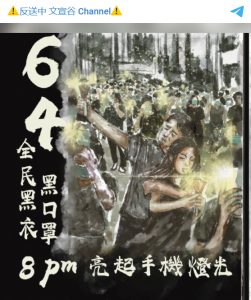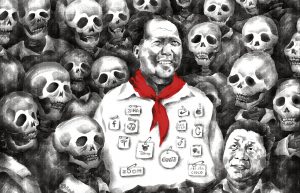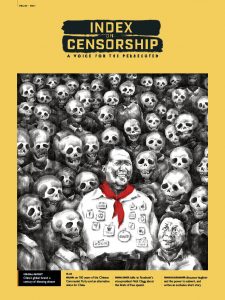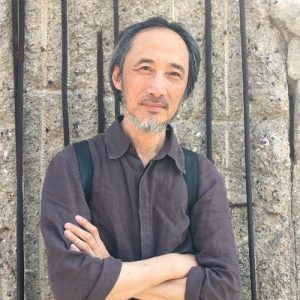4 Jun 2021 | Belarus, China, Hong Kong, News and features
[vc_row][vc_column][vc_column_text] As you scroll through your Telegram feed, one image jumps out.
As you scroll through your Telegram feed, one image jumps out.
It shows crowds of young Hong Kongers, all dressed in black, at a protest, holding their smartphones aloft like virtual cigarette lighters from a Telegram channel called HKerschedule.
The image is an invitation for young activists to congregate and march to mark the anniversary of the Tiananmen massacre on 4 June. Wearing black has been a form of protest for many years, which has led to suggestions that the authorities may arrest anyone doing so.
Calls to action like this have migrated from fly posters and other highly visible methods of communication online.
Secure messaging has become vital to organising protests against an oppressive state.
Many protest groups have used the encrypted service Telegram to schedule and plan demonstrations and marches. Countries across the world have attempted to ban it, with limited levels of success. Vladimir Putin’s Russia tried and failed, the regimes of China and Iran have come closest to eradicating its influence in their respective states.
Telegram, and other encrypted messaging services, are crucial for those intending to organise protests in countries where there is a severe crackdown on free speech. Myanmar, Belarus and Hong Kong have all seen people relying on the services.
It also means that news sites who have had their websites blocked, such as in the case of news website Tut.by in Belarus, or broadcaster Mizzima in Myanmar, have a safe and secure platform to broadcast from, should they so choose.
Belarusian freelance journalist Yauhen Merkis, who wrote for the most recent edition of the magazine, said such services were vital for both journalists and regular civilians.
“The importance of Telegram has grown in Belarus especially due to the blocking of the main news websites and problems accessing other social media platforms such as VK, OK and Facebook after August 2020,” he said.
“Telegram is easy to use, allows you to read the main news even in times of internet access restrictions, it’s a good platform to quickly share photos and videos and for regular users too: via Telegram-bots you could send a file to the editors of a particular Telegram channel in a second directly from a protest action, for example.”
The appeal, then, revolves around the safety of its usage, as well as access to well-sourced information from journalists.
In 2020, the Mobilise project set out to “analyse the micro-foundations of out-migration and mass protest”. In Belarus, it found that Telegram was the most trusted news source among the protesters taking part in the early stages of the demonstrations in the country that arose in August 2020, when President Alexander Lukashenko won a fifth term in office amidst an election result that was widely disputed.
But there are questions over its safety. Cooper Quintin, senior security researcher of the Electronic Frontier Foundation (EFF), a non-profit that aims to protect privacy online, said Telegram’s encryption “falls short”.
“End-to-end encryption is extremely important for everyone in the world, not just activists and journalists but regular people as well. Unfortunately, Telegram’s end-to-end encryption falls short in a couple of key areas. Firstly, end-to-end encryption isn’t enabled by default meaning that your conversations could be intercepted or recovered by a state-level actor if you don’t enable this, which most users are not aware of. Secondly, group conversations in Telegram are never encrypted [using end-to-end encryption], lacking even the option to do so, unlike other encrypted chat apps such as Signal, Wire, and Keybase.”
A Telegram spokesperson said: “Everything sent over Telegram is encrypted including messages sent in groups and posted to channels.”
This is true; however, messages sent using anything other than Secret Chats use so-called client-server/server-client encryption and are stored encrypted in Telegram’s cloud, allowing access to the messages if you lose your device, for example.
The platform says this means that messages can be securely backed up.
“We opted for a third approach by offering two distinct types of chats. Telegram disables default system backups and provides all users with an integrated security-focused backup solution in the form of Cloud Chats. Meanwhile, the separate entity of Secret Chats gives you full control over the data you do not want to be stored. This allows Telegram to be widely adopted in broad circles, not just by activists and dissidents, so that the simple fact of using Telegram does not mark users as targets for heightened surveillance in certain countries,” the company says in its FAQs.
The spokesperson said, “Telegram’s unique mix of end-to-end encryption and secure client-server encryption allows for the huge groups and channels that have made decentralized protests possible. Telegram’s end-to-end encrypted Secret Chats allow for an extra layer of security for those who are willing to accept the drawbacks of end-to-end encryption.”
If the app’s level of safety is up for debate, its impact and reach is less so.
Authorities are aware of the reach the app has and the level of influence its users can have. Roman Protasevich, the journalist currently detained in his home state after his flight from Greece to Lithuania was forcibly diverted to Minsk after entering Belarusian airspace, was working for Telegram channel Belamova. He previously co-founded and ran the Telegram channel Nexta Live, pictured.

Nexta’s Telegram page
Social media channels other than Telegram are easier to ban; Telegram access does not require a VPN, meaning even if governments choose to shut down internet providers, as the regimes in Myanmar and Belarus have done, access can be granted via mobile data. Mobile data is also targeted, but perhaps a problem easier to get around with alternative SIM cards from neighbouring countries.
People in Myanmar, for instance, have been known to use Thai SIM cards.
The site isn’t without controversy, however. Its very nature means it is a natural home for illicit activity such as revenge porn and use by extremists and terror groups. It is this that governments point to when trying to limit its reach.
China’s National Security Law attempts to censor information on the basis of criminalising any act of secession, subversion, terrorism, and collusion with external forces, the threshold for which is extremely low. It has a particular impact on protesters in Hong Kong. Telegram was therefore an easy target.
In July 2020, Telegram refused to comply with Chinese authorities attempting to gain access to user data. As they told the Hong Kong Free Press at the time: “Telegram does not intend to process any data requests related to its Hong Kong users until an international consensus is reached in relation to the ongoing political changes in the city.”
Telegram continues to resist calls to share information (which other companies have done): it even took the step of removing mobile numbers from its service, for fear of its users being identified.
Anyone who values freedom of expression and the right to protest should resist calls for messaging platforms like Telegram to pull back on encryption or to install back doors for governments. When authoritarian regimes are cracking down on independent media more than ever, platforms like these are often the only way for protests to be heard
[/vc_column_text][/vc_column][/vc_row][vc_row][vc_column][three_column_post title=”You may also want to read” category_id=”581″][/vc_column][/vc_row]
4 Jun 2021 | China, Hong Kong, Opinion, Ruth's blog
[vc_row][vc_column][vc_column_text]

Illustration: Badiucao
32 years ago, on 4 June 1989, the world bore witness to the realities of a totalitarian regime as the Chinese Communist Party deployed the People’s Liberation Army against unarmed protestors in Tiananmen Square. We still don’t know exactly how many people were brutally murdered although best estimates are in the thousands; the crackdown that followed across China shaped the country as we know it today and continues to resonate throughout the world.
‘Tank Man’, the image that is now synonymous with the events of Tiananmen Square, which shows an unarmed man seeking to block the movement of a tank by simply standing in front of it is both awful and awe-inspiring; it affected many of us in the decades that have followed, including me.
The Tiananmen Massacre shaped both my politics and my personal values. When you are lucky enough to be born and raised in a democracy the images from Beijing, from both the protests and the aftermath, were truly beyond comprehension. I was not yet 10 years old on the day of the massacre but I can remember the image of the man and a tank vividly.
It will surprise no one to learn that I grew up in a very political household and my extraordinary mum sat me down to explain what was happening thousands of miles away and why it was so important – but all I can really remember was fear for the man who was standing in front of a tank and an overwhelming sense of his bravery.
My home was one that celebrated collective action, a home that embraced the concept of solidarity and was internationalist – the image of the Tank Man was as crucial to my understanding of the world around me as the Miners’ Strike and the Poll Tax Riots. And without realising it, it was the events of Tiananmen Square on that fateful day which cemented my commitment to equality and justice – it also for the first time made me aware of the importance of a free press and free expression and of how the actions of one person on behalf of others can change the world.
These principles of anti-censorship, of solidarity, of equality and of justice are not only my values, but they are also the values of Index on Censorship and were those of our founders. As we reflect today on the events of 1989, we will remember not only the people who were killed for demanding a level of democracy in those fateful protests, but the people of Hong Kong who for the first time will be prevented from marking the anniversary because of the National Security Law imposed by the Chinese Communist Party. We stand with them today as we stood with the protestors in Tiananmen Square.[/vc_column_text][/vc_column][/vc_row][vc_row][vc_column][three_column_post title=”You may also want to read” category_id=”41669″][/vc_column][/vc_row]
30 Apr 2021 | China, Opinion, Ruth's blog, Uncategorized
[vc_row][vc_column][vc_column_text]
“When governments collaborate with totalitarian regimes committing atrocities, they grow richer, they get faster technology. But when they slowly discover that freedom of speech is growing smaller then this wealth, this technology, is meaningless”
Ma Jian
 Even in the middle of a global pandemic there has been one country that has broken through the news cycle – China. The acts of the Chinese government in recent years are a true cause for global concern. From Hong Kong to Tibet, from Xinjiang to Inner Mongolia we are all witnessing the actions of an authoritarian regime, one that seemingly thinks little of human rights or of its citizens. To the outside observer the Chinese government seems more interested in quashing dissent, re-writing history and bending the rest of the world to fit its narrative, than it does on embracing core human values.
Even in the middle of a global pandemic there has been one country that has broken through the news cycle – China. The acts of the Chinese government in recent years are a true cause for global concern. From Hong Kong to Tibet, from Xinjiang to Inner Mongolia we are all witnessing the actions of an authoritarian regime, one that seemingly thinks little of human rights or of its citizens. To the outside observer the Chinese government seems more interested in quashing dissent, re-writing history and bending the rest of the world to fit its narrative, than it does on embracing core human values.
Index has written extensively over many years about the impact of this within China, the effect on media freedom, freedom of expression and freedom online. We’ve highlighted the work of incredibly brave dissidents demanding democracy in Hong Kong. We’ve featured the words of Uighur poets, the writings and musings of Ai Weiwei and the amazing work of organisations like GreatFire who every day challenge the firewall that the Chinese government has erected, restricting their citizens access to global information.
But the Chinese government is more than an authoritarian government. It is a government built on the ideology and infrastructure of the Chinese Communist Party (CCP). This year marks the centenary of the CCP and in the latest edition of Index on Censorship magazine we’ve focused on the impact of the CCP both at home and abroad. Of the many features in our special report, what is most touching, at least for me, are the beautiful words of Ma Jian, the acclaimed writer in exile. Ma Jian reflects on the impact of the CCP on his life and why he has to live in exile.
When Index on Censorship was launched, one of our founders, Stephen Spender, was adamant that it was going to be more than a frustration sheet, we were going to be a home for amazing writing that inspired and moved us. Ma Jian’s words did exactly that, which he did once again when he spoke at the launch of the magazine on Wednesday.
His personal testimony will haunt me, his words were beautiful and reminded me once again of the vital importance of our work. Please take a minute to read Ma Jian in his own words, he will inspire you.
And to enter the bank holiday on a positive note, a few more words of hope from Ma Jian.
“The CCP will one day fall because it is not in tune with the values of humanity.”
[/vc_column_text][/vc_column][/vc_row][vc_row][vc_column][three_column_post title=”You may also want to read” category_id=”41669″][/vc_column][/vc_row]
28 Apr 2021 | Africa, Burma, China, Hong Kong, Magazine, Magazine Contents, Slapps, United States, Volume 50.01 Spring 2021, Volume 50.01 Spring 2021 extras

Illustration: Badiucao
Index looks back on 100 years of the Chinese Communist Party and how their censorship laws continue to shape the lives of people around the world and threaten their right to free speech. Inside this edition are articles by exiled writer Ma Jian and an interview with Facebook’s vice-president for global affairs, former UK deputy Prime minister Nick Clegg; as well as an exclusive short story from acclaimed writer Shalom Auslander.
Acting editor Martin Bright said: “I am delighted to introduce the latest edition of Index which marks the 100th anniversary of the Chinese Communist Party.”
“This year also marks the 50th anniversary of the magazine and I am proud that we are continuing the founders’ legacy of opposition to totalitarianism.”
“In this Spring edition of Index we are particularly pleased to publish an exclusive essay by the celebrated Chinese writer Ma Jian, who suggests that an alternative tradition of tolerance and freedom is still possible.”
 A century of silencing dissent by Martin Bright: We look at 100 years of the Chinese Communist Party and the methods of control that it has adapted to stifle free expression and spread its ideas throughout the world
A century of silencing dissent by Martin Bright: We look at 100 years of the Chinese Communist Party and the methods of control that it has adapted to stifle free expression and spread its ideas throughout the world
The Index: Free expression round the world today: the inspiring voices, the people who have been imprisoned and the trends, legislation and technology which are causing concern
Fighting back against the menace of Slapps by Jessica Ní Mhainín: Governments continue to threaten journalists with vexatious law suits to stop critical reporting
Friendless Facebook by Sarah Sands: An interview with Facebook vice-president Nick Clegg about being a British liberal at the heart of the US tech giant
Standing up to a global giant by Steven Donziger: A lawyer who has gone head to head with the oil industry since 1993 at great personal cost tells his story
Fear and loathing in Belarus by Yahuen Merkis and Larysa Shchryakova: The crackdown on journalism has continued with arrests. Read the testimony of two reporters
Killed by the truth by Bilal Ahmad Pandow: Babar Qadri was one of Kashmir’s most strident voices, until he was gunned down in his garden
Cartoon by Ben Jennings: Arguments about the removal of statues cause a stir
The martial art of free speech by Ari Deller and Laura Janner-Klausner: The question of Cancel Culture continues to rage. Is it really a problem?

Ma Jian
Burning through censorship: Censorship-busting online organisation GreatFire celebrates its 10th anniversary
The party is your idol by Tianyu M. Fang: China’s propaganda is adapting to target young people
Past imperfect by Rachael Jolley: Four historians explain how the CCP shaped China and ask if globalisation will be its undoing
Turkey changes its tune by Kaya Genç: Uighur refugees living in Turkey find themselves victims of a change in foreign policy
The human face and the boot by Ma Jian: The acclaimed writer-in-exile reflects on 100 years of the CCP and its legacy of bloodshed
A moral hazard by Sally Gimson: Universities around the world and the CCP’s challenges to academic freedom
Director’s cuts by Chris Yeung: Hong Kong broadcaster RTHK has been squeezed by China’s tightening control
Beijing buys Africa’s silence by Issa Sikiti da Silva: Africa’s rich natural resources are being hoovered up by China
A new world order by Natasha Joseph: Journalist Azad Essa found when he wrote about China in Africa, his writing was silenced
A most unlikely ally by Stefan Pozzebon: Paraguay has long been an ally of Taiwan, but it’s paying an economic price
China’s artful dissident: A profile of our cover artist: the exiled cartoonist Badiucao.
Lies, damned lies and fake news by Nick Anstead: Fake news is rife, rampant and harmful. And we can only counter it by making sure that the truth is heard
Censorship? Hardly by Clive Priddle: Even the most controversial book usually finds a publisher after it has been turned down
A voice for the persecuted by Ruth Smeeth: As Index celebrates its 50 year anniversary, we note why free speech is still important

Collective ©ALEXANDER NANAU PRODUCTION
Don’t joke about Jesus by Shalom Auslander: An exclusive short story based on a joke by the acclaimed author of Mother for Dinner
Poet who haunts Ukraine by Steve Komarnyckyj: Vasyl Stus, the writer who remains a Ukrainian hero, 35 years after perishing in a Soviet gulag
The freedom of exile by Khaled Alesmael, Leah Cross: A young refugee Syrian writer on the love between Arab men
Forbidden love songs by Benjamin Lynch: Iran’s underground pop music scene upsets the regime
Reviews: Saudi Arabia’s murder of Jamal Khashoggi, USA Gymnastics and healthcare in Romania: we review three new documentaries
War of the airwaves by Ian Burrell: The Chinese government faces difficulties with its propaganda network CGTN
 As you scroll through your Telegram feed, one image jumps out.
As you scroll through your Telegram feed, one image jumps out.


 Even in the middle of a global pandemic there has been one country that has broken through the news cycle – China. The acts of the Chinese government in recent years are a true cause for global concern. From Hong Kong to Tibet, from Xinjiang to Inner Mongolia we are all witnessing the actions of an authoritarian regime, one that seemingly thinks little of human rights or of its citizens. To the outside observer the Chinese government seems more interested in quashing dissent, re-writing history and bending the rest of the world to fit its narrative, than it does on embracing core human values.
Even in the middle of a global pandemic there has been one country that has broken through the news cycle – China. The acts of the Chinese government in recent years are a true cause for global concern. From Hong Kong to Tibet, from Xinjiang to Inner Mongolia we are all witnessing the actions of an authoritarian regime, one that seemingly thinks little of human rights or of its citizens. To the outside observer the Chinese government seems more interested in quashing dissent, re-writing history and bending the rest of the world to fit its narrative, than it does on embracing core human values.


